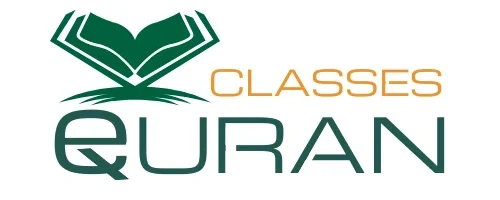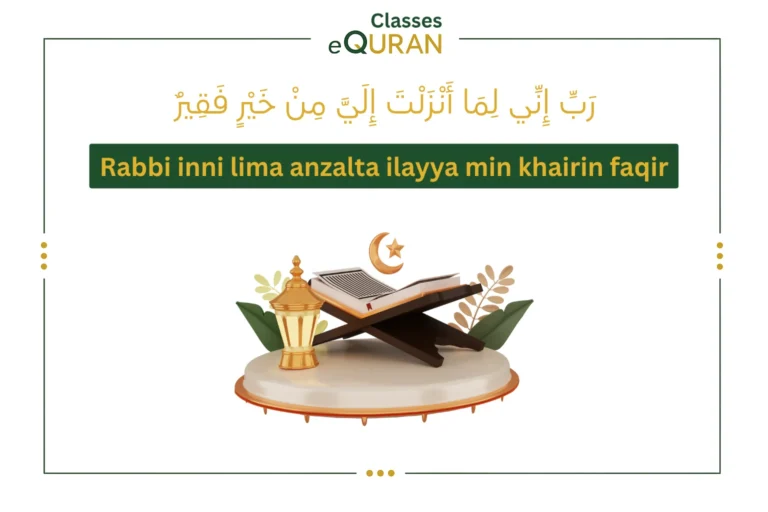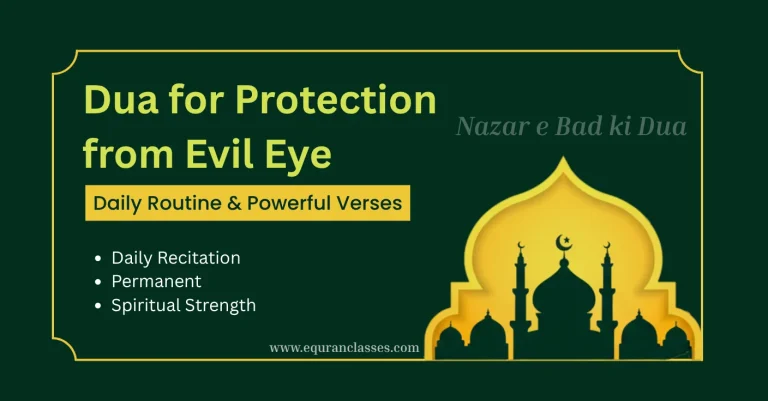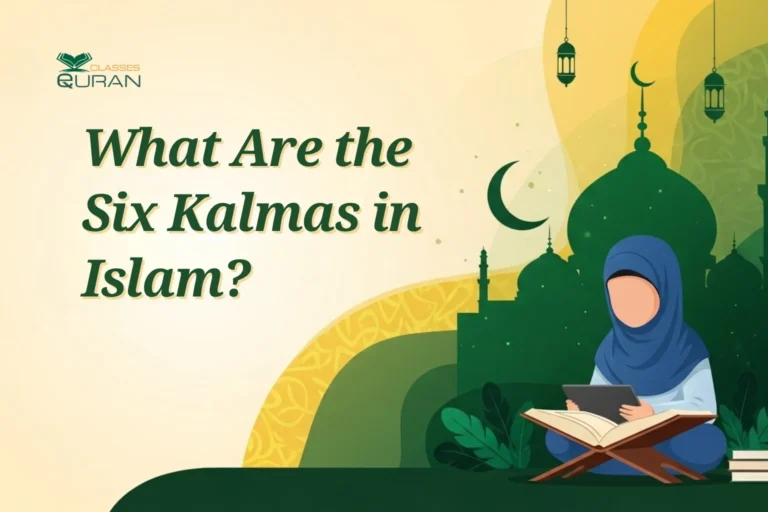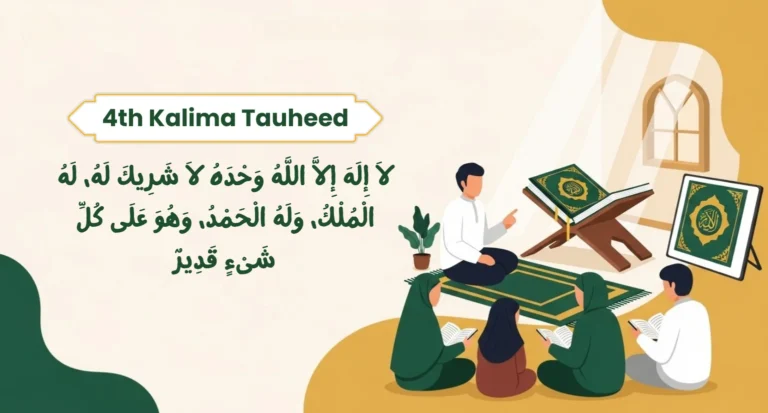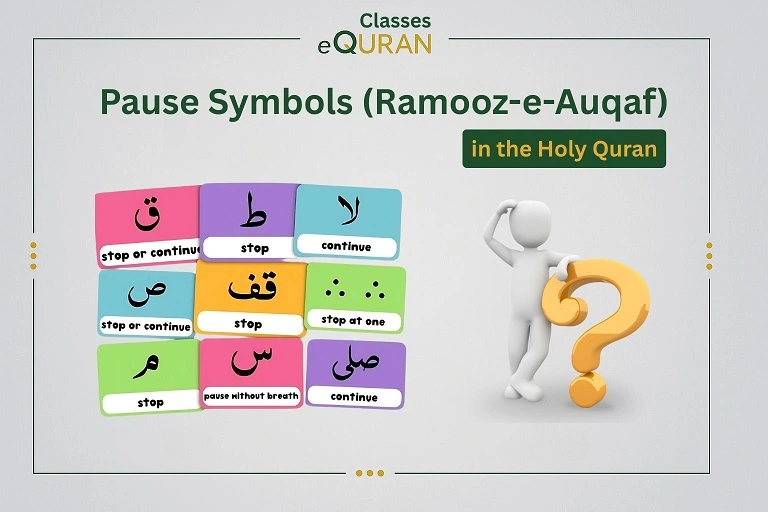Surah Baqarah Last Two Ayats: Your Path to Protection, Peace, and Blessings
Introduction: Why These Ayats Matter
As-salamu Alaikum, dear learner! Imagine ending your day with a few sacred words that wrap your heart in peace and shield your home from harm. That’s the power of the last two Ayats of Surah Al-Baqarah (2:285-286). As the Quran’s longest chapter, Surah Al-Baqarah is a treasure of guidance, and these final verses, revealed during the Prophet’s (PBUH) Night Journey (Isra and Mi’raj), are a divine gift for every Muslim. They carry a message of faith, accountability, and Allah’s boundless mercy, offering protection and blessings to believers worldwide.
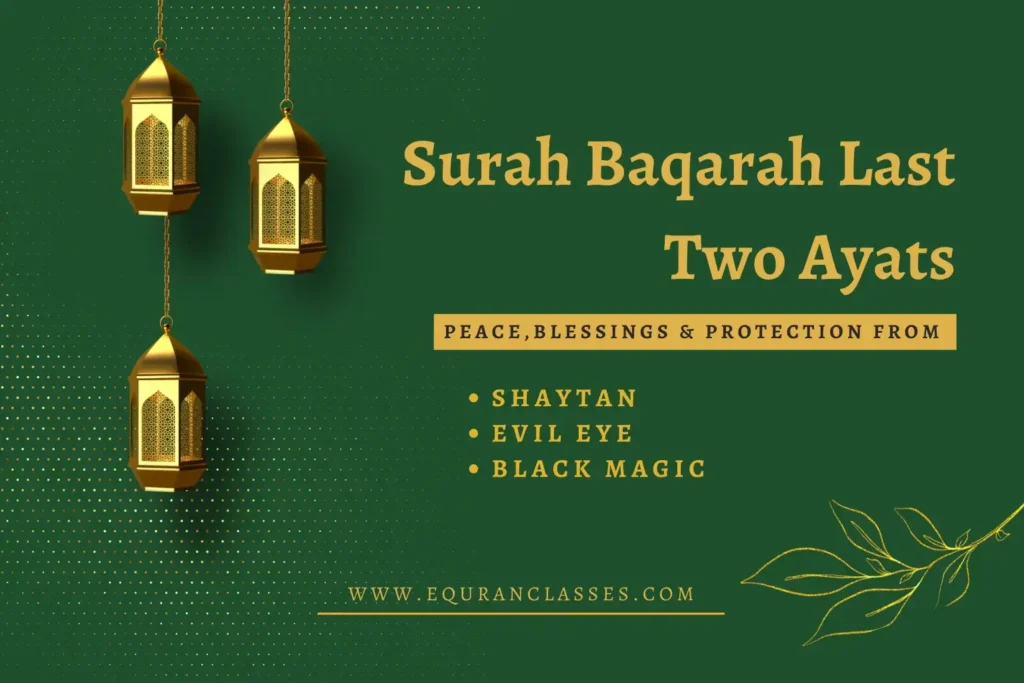
Sometimes, you’ll hear Ayah 284 included in discussions, as it reminds us of Allah’s all-knowing nature—everything we do, hidden or open, is seen by our Lord. For me, as a busy mom juggling work and kids in London, reciting these Ayats at night feels like a warm embrace from Allah, easing my worries. Whether you’re a parent in Pakistan teaching your kids the Quran, a young professional in Nigeria seeking spiritual calm, or a new Muslim in the UK starting your journey, these verses are for you.
The Last Two Ayats of Surah Baqarah in Arabic
The last two verses of Surah Al-Baqarah (2:285-286) are very blessed and fill the heart with light. Their words, revealed to the Prophet (PBUH) during the Night Journey, carry the beauty of faith and Allah’s mercy. For some, Ayah 284 is included to highlight Allah’s all-knowing nature, setting the stage for the powerful supplication in Ayats 285-286. Below, we present these sacred verses in Arabic, formatted clearly for you to read and cherish.
Al-Quran 2:284
لِلَّهِ مَا فِي السَّمَاوَاتِ وَمَا فِي الْأَرْضِ ۗ وَإِن تُبْدُوا مَا فِي أَنفُسِكُمْ أَوْ تُخْفُوهُ يُحَاسِبْكُم بِهِ اللَّهُ ۗ فَيَغْفِرُ لِمَن يَشَاءُ وَيُعَذِّبُ مَن يَشَاءُ ۗ وَاللَّهُ عَلَىٰ كُلِّ شَيْءٍ قَدِيرٌ
Al-Quran 2:285
آمَنَ الرَّسُولُ بِمَا أُنزِلَ إِلَيْهِ مِن رَّبِّهِ وَالْمُؤْمِنُونَ ۚ كُلٌّ آمَنَ بِاللَّهِ وَمَلَائِكَتِهِ وَكُتُبِهِ وَرُسُلِهِ لَا نُفَرِّقُ بَيْنَ أَحَدٍ مِّن رُّسُلِهِ ۚ وَقَالُوا سَمِعْنَا وَأَطَعْنَا ۖ غُفْرَانَكَ رَبَّنَا وَإِلَيْكَ الْمَصِيرُ
Al-Quran 2:286
لَا يُكَلِّفُ اللَّهُ نَفْسًا إِلَّا وُسْعَهَا ۚ لَهَا مَا كَسَبَتْ وَعَلَيْهَا مَا اكْتَسَبَتْ ۗ رَبَّنَا لَا تُؤَاخِذْنَا إِن نَّسِينَا أَوْ أَخْطَأْنَا ۚ رَبَّنَا وَلَا تَحْمِلْ عَلَيْنَا إِصْرًا كَمَا حَمَلْتَهُ عَلَى الَّذِينَ مِن قَبْلِنَا ۚ رَبَّنَا وَلَا تُحَمِّلْنَا مَا لَا طَاقَةَ لَنَا بِهِ ۖ وَاعْفُ عَنَّا وَاغْفِرْ لَنَا وَارْحَمْنَا ۚ أَنتَ مَوْلَانَا فَانصُرْنَا عَلَى الْقَوْمِ الْكَافِرِينَ
The beauty of reciting these Ayats lies in their rhythm and meaning, a gift best experienced with proper Tajweed.
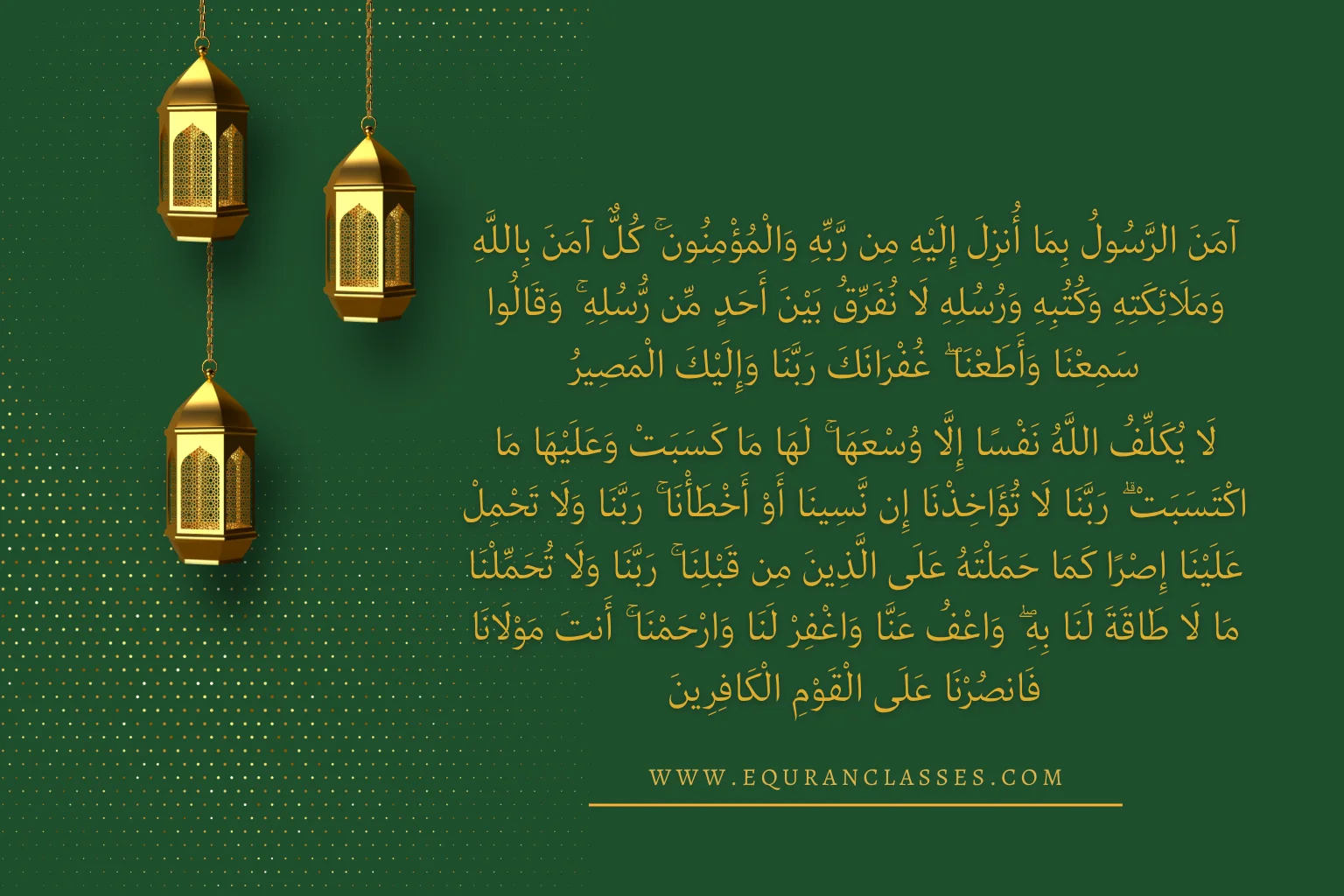
Transliteration for Non-Arabic Speakers
Dear learner! Not fluent in Arabic? No worries! The last two Ayats of Surah Al-Baqarah (2:285-286), Amana Rasul, are easy to learn with our precise transliteration. This helps everyone—whether you’re a busy parent in London, a student in Lahore, or a new Muslim in Texas—recite these sacred verses with confidence. Below is the transliteration, designed for accessibility and perfect for those searching for the last two ayats of Surah Baqarah.
Ayat 285
Amana-r-Rasulu bima unzila ilayhi min Rabbih wal-mu’minoon, kullun aamana billahi wa malaa’ikatihi wa kutubihi wa rusulih, laa nufarriqu bayna ahadin min rusulih, wa qaaloo sami’naa wa ata’naa, ghufranak Rabbanaa wa ilaykal-maseer.
Ayat 286
Laa yukallifullahu nafsan illa wus’ahaa, lahaa maa kasabat wa ‘alayhaa maktasabat, Rabbanaa laa tu’aakhidhnaa in-naseenaa aw akhta’naa, Rabbanaa wa laa tahmil ‘alaynaa isran kamaa hamaltahu ‘alalladheena min qablinaa, Rabbanaa wa laa tuhammilnaa maa laa taaqata lanaa bih, wa’fu ‘annaa waghfir lanaa warhamnaa, anta mawlaanaa fansurna ‘alal-qawmil-kaafireen.
Pronunciation Tips
- Stress softly on ‘Amana’: Say it gently, like “Aah-mana,” to get the Makharij (pronunciation points) right.
- Pause at commas: Take a breath at each comma to keep the rhythm.
- Practice ‘ghufranak’: Roll the “gh” lightly from your throat for authenticity.
- Want to hear it? Our eQuran Classes offer audio playback by Mishary Al-Afasy, perfect for beginners in Birmingham, Lagos, or beyond.
English Translation and Simple Explanation
The last two Ayats of Surah Al-Baqarah (2:285-286) are a powerful declaration of faith and a heartfelt dua to Allah. For context, some include Ayah 284, which reminds us of Allah’s all-knowing nature. Below, we share the Sahih International translation and explain each Ayah in simple words, so everyone—kids in the USA, moms in the UK, or students in Norway—can feel their beauty and blessings.
Ayah 284 (Optional Context):
“To Allah belongs whatever is in the heavens and whatever is on earth. Whether you show what is within your minds or conceal it, Allah will bring you to account for it. He forgives whom He wills and punishes whom He wills, and Allah is over all things competent.”
Explanation: This Ayah reminds us that Allah knows everything—our thoughts, actions, and secrets. It encourages us to be honest and seek His mercy, knowing He is just and forgiving.
Ayah 285:
“The Messenger has believed in what was revealed to him from his Lord, and [so have] the believers. All of them have believed in Allah and His angels and His books and His messengers, [saying], ‘We make no distinction between any of His messengers.’ And they say, ‘We hear and we obey. [We seek] Your forgiveness, our Lord, and to You is the [final] destination.'”
Explanation: This Ayah is about faith. It says the Prophet (PBUH) and all believers trust in Allah, His angels, books (like the Quran and Torah), and messengers (like Muhammad and Jesus, peace be upon them). We don’t favor one Prophet over another. It ends with a promise: “We hear and obey,” asking Allah for forgiveness as we return to Him.
Ayah 286:
“Allah does not charge a soul except [with that within] its capacity. It will have [the consequence of] what [good] it has gained, and it will bear [the consequence of] what [evil] it has earned. ‘Our Lord, do not impose blame upon us if we have forgotten or erred. Our Lord, and lay not upon us a burden like that which You laid upon those before us. Our Lord, and burden us not with that which we cannot bear. And pardon us; and forgive us; and have mercy upon us. You are our protector, so give us victory over the disbelieving people.'”
Explanation: This Ayah is a beautiful dua. It reminds us that Allah only gives us challenges we can handle. We’re rewarded for good deeds and responsible for bad ones. It’s a prayer asking Allah not to punish us for honest mistakes, to lighten our burdens, and to grant forgiveness, mercy, and victory.
Tafsir: Unlocking the Deeper Meaning of Last Two Ayats
Dear learner! The last two Ayats of Surah Al-Baqarah (2:285-286) are a treasure of wisdom, guiding us to faith, accountability, and Allah’s mercy. Some include Ayah 284 for its powerful reminder of Allah’s all-knowing nature. By exploring the Tafsir (exegesis) from renowned scholars like Al-Tabari and Ibn Kathir, we uncover the profound meaning of these verses, answering the question, What is the meaning of the last two ayats of Surah Baqarah? Whether you’re a student in Lagos, a parent in Lahore, or a new Muslim in London, these lessons will touch your heart, Insha’Allah.
Faith: Unity in Believing All Prophets and Books
Ayah 285 declares that the Prophet Muhammad (PBUH) and believers accept everything revealed by Allah—His angels, books (like the Quran, Torah, and Injeel), and messengers (from Adam to Muhammad, peace be upon them). Tafsir Al-Tabari explains this as a call for unity: Muslims must believe in all prophets without favoring one over another. This strengthens our faith by connecting us to the universal message of Islam. For example, saying, “We hear and we obey,” shows our commitment to Allah’s guidance, a promise that binds Muslims worldwide.
Accountability: Allah’s All-Encompassing Knowledge
Ayah 284, often included for context, reminds us that “To Allah belongs whatever is in the heavens and earth.” Ibn Kathir’s Tafsir highlights that Allah knows our thoughts, words, and deeds—whether we share them or hide them. This teaches accountability: we strive to act with sincerity, knowing Allah sees everything. Yet, it’s also comforting, as Allah’s mercy allows forgiveness for those who seek it, encouraging us to stay humble and repent.
Mercy: A Dua for Ease and Forgiveness
Ayah 286 is a heartfelt supplication: “Allah does not charge a soul except [with that within] its capacity.” Tafsir Al-Tabari emphasizes that Allah is just—He never burdens us beyond what we can bear. The dua asks for pardon for mistakes, relief from heavy burdens, and mercy to overcome challenges. Ibn Kathir notes that this prayer for forgiveness, mercy, and victory reflects Allah’s compassion, making these Ayats a source of hope for every believer.
Personal Reflection: As a teacher with eQuran Classes, these Ayats taught me to trust Allah’s plan during tough times. When I faced stress balancing work and family in Birmingham, reciting these two Ayats reminded me that Allah only tests us within our strength. This gave me peace and courage, and I’ve seen students from the UK to Australia find the same comfort.
Spiritual and Practical Benefits of Reciting the Last Two Ayats of Surah Baqarah
Dear learner! The last two Ayats of Surah Al-Baqarah (2:285-286) are a divine gift, offering protection, mercy, and strength to Muslims worldwide. Whether you’re a busy parent in Lahore, a student in Lagos, or a new Muslim in London, reciting these verses brings blessings that transform your life. Backed by authentic Hadiths and cherished by believers, here are the spiritual and practical benefits of reciting these ayats, answering the question, What are the benefits of the last two ayats in Surah Baqarah?
- Spiritual Protection: A Hadith in Sahih al-Bukhari (5009) states, “If somebody recites the last two verses of Surah Al-Baqarah at night, that will be sufficient for him.” This means protection from Shaytan, the evil eye, and black magic. Recite them before bed to shield your home.
- Forgiveness and Mercy: Ayah 286’s heartfelt dua pleads, “Pardon us; forgive us; have mercy upon us.” Tafsir Ibn Kathir explains that this supplication seeks Allah’s pardon for mistakes, offering comfort to believers seeking forgiveness, especially during tough times.
- Strength and Resilience: These Ayats remind us, “Allah does not charge a soul except its capacity.” This promise builds trust in Allah’s plan, giving resilience to face hardships, as our UK students have shared after stressful days.
- Divine Assistance: The dua in Ayah 286 asks for victory and ease: “You are our protector, so give us victory.” This inspires hope for Allah’s help in daily challenges, from work stress.
- Protection from Evil Eye and Witchcraft: As part of morning and evening Azkar, reciting these Ayats guards against harmful forces like the evil eye and black magic, a practice valued by our Australian learners.
At eQuran Classes, our Wifaq ul Madaris-certified Hafizas guide you to recite these Ayats with Tajweed, unlocking their full spiritual impact. Whether you’re in Lagos, London, or beyond, join our online classes or try our audio playback to start reaping these blessings. Sign up for our free 3-day trial.
| Benefit | Description | Hadith Reference |
|---|---|---|
| Spiritual Protection | Shields from Shaytan, evil eye, and black magic when recited at night. | Sahih al-Bukhari (5009): “Recite at night, and it will suffice you.” |
| Forgiveness and Mercy | Seeks Allah’s pardon through Ayah 286’s dua, offering spiritual comfort. | Tafsir Ibn Kathir: Emphasizes dua for forgiveness. |
| Strength and Resilience | Builds trust in Allah’s plan, helping believers face hardships. | Ayah 286: “Allah does not charge a soul except [with that within] its capacity.” |
| Divine Assistance | Pleads for victory and ease in challenges, fostering hope. | Ayah 286: “You are our protector, so give us victory.” |
| Protection from Evil Eye/Witchcraft | Guards against harmful forces as part of morning/evening Azkar. | Jami‘ at-Tirmidhi (2882): Protection when recited thrice. |
Hadiths on the Power of These Verses
Dear learner! The last two Ayats of Surah Al-Baqarah (2:285-286) are treasures from Allah, supported by powerful Hadiths that underscore their spiritual significance. These sayings of the Prophet Muhammad (PBUH) show why reciting these verses brings protection, peace, and blessings to Muslims. Below, we summarize key Hadiths to answer common questions about the benefits of the last two Ayats of Surah Al-Baqarah and explain what “sufficiency” means, making it easy for parents, students, and new Muslims to embrace these Ayats, Insha’Allah.
- Sahih al-Bukhari (5009): The Prophet (PBUH) said, “If somebody recites the last two verses of Surah Al-Baqarah at night, that will be sufficient for him.” This means reciting these ayats before bed protects you spiritually and physically from harm, like Shaytan or the evil eye, as our Nigerian students have experienced.
- Jami’ at-Tirmidhi (2882): Reciting these verses three times at night offers protection from Shaytan until morning. This is a simple practice our UK parents teach their kids for nightly peace.
- An-Numan bin Bashir (Sahih): The Prophet (PBUH) said, “Indeed Allah wrote in a book two thousand years before He created the heavens and the earth…” referring to these Ayats. This emphasizes their eternal significance as a source of guidance and blessings.
What Does “Sufficiency” Mean?
The term “suffice” in Sahih al-Bukhari (5009) means these Ayats act as a shield, offering spiritual protection from evil forces and physical safety from harm, like black magic or the evil eye. They also fulfill your heart with faith and peace, as our students in Pakistan have shared after reciting them nightly. At eQuran Classes, our Wifaq ul Madaris-certified Hafizas help you master these Ayats with proper Tajweed, ensuring you unlock their full power. Join our online classes to start reciting today.
How to Recite and Memorize the Last Two Ayats
Dear learner! Learning to recite and memorize the last two Ayats of Surah Al-Baqarah (2:285-286) is easier than you think, even if you’re a beginner! These verses, packed with blessings and protection, can become part of your daily life, whether you’re a busy mom in London, a student in Lagos, or a parent in Texas teaching your kids. With our Wifaq ul Madaris-certified Hafizas, eQuran Classes make it fun and straightforward.
- Listen First: Start by listening to the correct Tajweed. Click here to hear Mishary Al-Afasy’s beautiful recitation. This helps you catch the rhythm, especially for non-Arabic speakers.
- Start Slow: Practice one line daily with a Hafiza for clarity. Focus on pronouncing each word, like “Amana” or “ghufranak,” with proper Makharij (articulation points). Our female tutors guide women and kids in Lagos and beyond to recite with confidence.
- Recite Nightly: Recite these Ayats before sleep for protection, as promised in Sahih al-Bukhari (5009): “If somebody recites the last two verses of Surah Al-Baqarah at night, that will be sufficient for him.” This shields you from Shaytan and harm, as our Pakistani students love doing!
- Self-Ruqyah: For protection from the evil eye or black magic, recite Amana Rasul into your hands, blow gently, and rub over your body. This simple practice, rooted in Sunnah, brings peace, as our Birmingham learners have shared.
- Join Classes: Sign up for our Zoom classes with female tutors, perfect for women and kids. Whether in London, Texas, or Lagos, our flexible lessons fit your schedule. Try our free 3-day trial to start today!
With these steps, you’ll recite Amana Rasul like a pro, bringing peace and protection to your life. Join our global community at eQuran Classes and start your Quran journey, Insha’Allah!
Amana Rasul vs. Ayat Al-Kursi: What’s Unique?
Dear learner! You may have heard of Ayat Al-Kursi (Surah Al-Baqarah 2:255), often called the “most powerful ayat in Surah Baqarah” for its majestic description of Allah’s sovereignty. But how does it compare to the last two Ayats of Surah Al-Baqarah (2:285-286)? Both are treasures from the Quran, yet each shines in its own way. Let’s explore what makes Al-Baqarah (2:285-286) unique and ideal for daily recitation and protection.
- Ayat Al-Kursi (2:255): This verse, referenced in sources like Wikipedia, emphasizes Allah’s supreme authority—”The Ever-Living, The Sustainer of existence.” It’s a powerful shield, often recited for protection from Shaytan and harm, as per Hadith (Sahih al-Bukhari 2311). Its focus is on Allah’s unmatched greatness and guardianship.
- Surah Al-Baqarah (2:285-286): These Ayats focus on faith, accountability, and supplication. They declare belief in Allah, His messengers, books, and angels, and include a heartfelt dua for forgiveness, mercy, and ease: “Our Lord, do not burden us with what we cannot bear.” A Hadith in Sahih al-Bukhari (5009) promises that reciting these verses at night “will be sufficient” for protection and blessings.
- Why Al-Baqarah (2:285-286): is Ideal: While Ayat Al-Kursi is a single verse celebrating Allah’s sovereignty, (2:285-286) combines faith affirmation with a direct prayer for mercy and relief, making it perfect for daily recitation, especially before bed. Its protective power against the evil eye and black magic, as part of Azkar, suits busy parents in Pakistan or students in Texas seeking peace.
At eQuran Classes, we help you master both with our Wifaq ul Madaris-certified tutors. Try our online Tajweed courses to recite the Holy Quran with heart, Insha’Allah!
Integrating Amana Rasul into Daily Life
Reciting the last two Ayats of Surah Al-Baqarah is like carrying a spiritual shield wherever you go. These practical tips make Amana Rasul a seamless part of your routine, whether you’re a mom in Birmingham, a professional in Karachi, or a new Muslim in Lagos. Here’s how to bring their blessings into your life, inspired by our global students.
- Recite After Fajr or Maghrib: Include Amana Rasul in your morning or evening Azkar for protection from the evil eye and harm, as recommended in Sunnah practices.
- Teach Kids During Family Quran Time: Use our eQuran Classes app with interactive audio and auto-scroll to make learning fun. Turn recitation into a bedtime ritual—kids in Lahore sing it like a nasheed!
- Use as a Dua During Stress: Feeling overwhelmed? Recite the dua in Ayah 286—”Our Lord, burden us not with what we cannot bear”—to find calm.
- Self-Ruqyah for Protection: Recite last two ayats of Al-Baqarah into your hands, blow gently, and rub over your body to guard against the evil eye or black magic, a practice rooted in Hadith. This is a favorite among our Pakistani families.
Why Choose eQuran Classes for Your Quran Journey?
At eQuran Classes, we’re more than an academy—we’re your partners in connecting with the Quran’s blessings. Here’s why thousands trust us to learn online Quran and more:
- Experience: Our tutors share heartfelt stories of teaching Amana Rasul to students worldwide, from kids in Melbourne to adults in the UK, making learning personal and meaningful.
- Expertise: Our Wifaq ul Madaris-certified Qaris and Hafizas, backed by our founder’s MPhil in Islamic Studies, ensure authentic, high-quality teaching tailored to your needs.
- Authoritativeness: With over 9 years of experience and thousands of students globally, we’re a trusted leader in online Quran education.
- Trustworthiness: Our secure LMS, free 3-day trial, and 30% Ramadan discounts make learning accessible and safe for all.
Frequently Asked Questions About the Six Kalmas
Got questions about the last two Ayats of Surah Al-Baqarah (2:285-286)? We’ve got answers to help you embrace these powerful verses. Here, we tackle common queries with a conversational vibe to make things clear and straightforward, Insha’Allah!
Conclusion: Embrace the Blessings of last two Ayats of Surah Al-Baqarah
The last two Ayats of Surah Al-Baqarah (2:285-286), are a divine gift, wrapping your heart in protection, forgiveness, peace, and resilience. Reciting these verses nightly shields you from harm, as promised in Sahih al-Bukhari (5009), while their heartfelt dua seeks Allah’s mercy and strength for life’s challenges. Whether you’re a busy parent in Lahore, a student in Lagos, or a new Muslim in London, these Ayats bring you closer to Allah, offering comfort and hope, Insha’Allah.
Feel Allah’s mercy every night with these Ayats. Picture the calm of reciting Amana Rasul before bed, knowing Allah’s love guards you.
